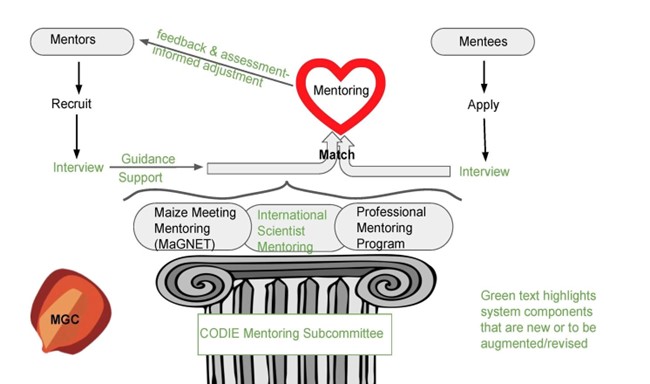Culturally Responsive Mentoring
Laurie Smith, Mark Lubkowitz, John Fowler, Tessa Durham Brooks, Sylvia M. de Sousa, Marna Yandeau-Nelson
The Maize Genetics Cooperation capstone project focused on the topic of “culturally responsive mentoring”. We chose this topic with the goal of promoting continued involvement of marginalized scientists in maize genetics via expansion and revision of our mentoring practices. This project also gave us the opportunity to build on two mentoring initiatives already started within our Society in recent years: a professional mentoring program that pairs early career scientists with mentors at more advanced career stages, and a conference mentor program for recipients of MaGNET awards funding the participation of scientists from historically marginalized groups. Six MGC members worked on this project, including representatives of the Board of Directors and the Committee on Outreach, Diversity, Inclusion and Education (CODIE). The diagram below provides a visual summary of our current initiatives (black font) along with new components we plan to add or augment/revise.

A summary of the initiatives we plan to pursue is as follows:
- Create a mentoring subcommittee within CODIE that supports and coordinates all initiatives outlined here, and ensures that cultural responsiveness remains a high priority. This group will include capstone project participants, leaders of established mentoring programs, and early career scientists.
- Provide opportunities for MGC members to learn about culturally responsive mentoring (guidelines, workshops, round table discussions, literature discussion sessions, etc.)
- Reconfigure the mentor-mentee matching processes in our established programs to increase their cultural responsiveness. This will include the use of interviews to learn more about both prospective mentees and mentors.
- Improve the collection and use of feedback from mentees to improve cultural responsiveness of our mentoring programs. We have identified some best practices we would like to implement.
- Create a new mentoring program serving the unique needs of international maize geneticists.
- Expand the practice and efficacy of mentoring within and beyond our formal programs to work towards building a culture of mentoring within the MGC.
0 Comments